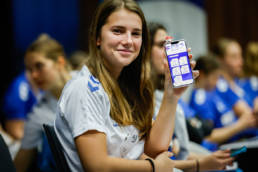Dual career programmes depend on the quality of implementation at professional levels close to the athlete. However, in 2017, more than one third of the EU member states self-rated their status and development of support arrangements as negative. To tackle this problem, the Amsterdam University of Applied Sciences (AUAS) and TWIN have co-designed the Erasmus+ project “STARTING 11 – The European Dual Career Toolkit” which shall help dual career stakeholders implement effective athlete services.
STARTING 11 unites some of Europe’s leading institutions in dual career. Next to AUAS and TWIN, these are Sportlycée Luxembourg (Luxembourg), Talented Athlete Scholarship Scheme (TASS) (United Kingdom), German University Sports Federation (ADH) (Germany), European Athlete Student (EAS) (Malta) and CREPS Toulouse (France).
Closing the gap between policy, research and practice
In the EU, the number of athletes in need of dual career services adds up to more than 120.000 in every Olympic cycle. From talented level and elite sport to the transition to post-athletic life, the quality of provided dual career support services are of vital importance to athletes.
STARTING 11 caters to close the gap between policy, research and practice. Positioned between the EU Guidelines on Dual Careers of Athletes and local/regional/national dual career stakeholders wanting to adopt these guidelines, the project contributes to professionalize the European dual career environment. Essentially, the European Dual Career Toolkit aims to facilitate the implementation of dual career services by providing a set of self-applicable tools to key actors in sport, education and the labour market:
- Sport: National Olympic Committees, high performance centres, sport federations, clubs, sport academies, player unions
- Education: Sport schools, universities, further education institutes, training institutes for sport coaches
- Labour market: Job agencies, public employers of athletes, private employers of athletes
- Other: Lead agencies on dual career
Implementation support
The European Dual Career Toolkit provides the aforementioned key actors with a variety of tools to better support their athletes in all stages of their sporting career. Our freely accessible toolkit will be published in December 2021 on www.starting11.eu and is composed of a variety of practical tools spanning four main dual career service areas:
- Management focuses on promoting the political, theoretical and infrastructural know-how to implement and administrate dual career services.
- Framework targets programmes at a school and higher education level to contribute to conditions in which dual careers can successfully be realized.
- Dual career counselling aims at inter-personal counselling services to foster the coping, decision-making and planning ability of an athlete within times of fundamental change and transition.
- Communication caters to the identification of and efficient communication towards the most relevant dual career stakeholders.
By means of the toolkit, STARTING 11 aims to have a structural and durable impact on dual career implementation throughout the EU. The project’s integrated approach shall ultimately result in the up skilling of dual career practitioners, increased employability of athletes and a multi-directional raise of awareness across sport, education and the labour market.
References
- European Commission (2012): EU Guidelines on Dual Careers of Athletes
- European Commission (2016): Study on the Minimum Quality Requirements for Dual Career Services. Research report
- European Commission (2017): Report on the state of play concerning the implementation of the EU guidelines on dual careers of athletes




